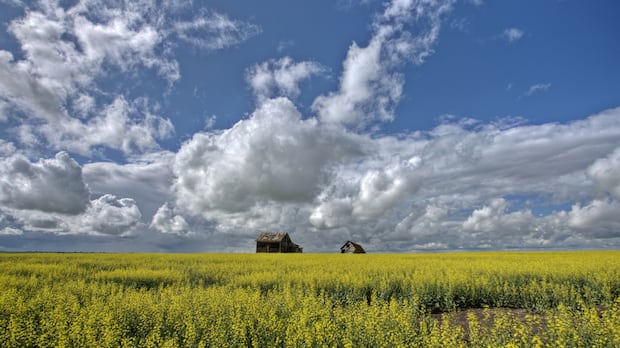SaskatchewanAccording to data from the Canola Council of Canada, China and the United States together comprised more than 83 per cent of Saskatchewan’s canola exports. Amid tariff woes and trade uncertainty, the province is looking to diversify export markets. Sask. trade and export minister says Southeast Asia region among top 3 prioritiesKatie Swyers · CBC News · Posted: Oct 15, 2025 6:00 AM EDT | Last Updated: 3 hours agoThe provincial government says it’s looking to diversify export markets for canola, as Saskatchewan producers harvest a strong crop while facing pricing uncertainty. (Pictureguy / Shutterstock)Saskatchewan’s canola has long found a home in two major markets abroad: China and the United States, with more than 83 per cent of the province’s total canola exports going to those markets last year, according to data from the Canola Council of Canada. However, with punishing tariffs from China effectively closing the market to Canadian producers, plus trade uncertainty with the United States, the provincial government is looking to diversify export markets for canola. “We’ve got a pretty short rope here, I think, to start seeing some actions to support our canola growers here in the province,” Warren Kaeding, Saskatchewan’s minister of trade and export development, said in an interview.According to Statistics Canada data, Saskatchewan’s exports to China have dropped dramatically ever since China slapped Canadian canola seed with a 75.8 per cent “anti-dumping” tariff in August and a 100 per cent tariff rate on canola oil and meal in March. Kaeding said he’s hopeful that additional support for the sector will be “coming shortly.” “The canola industry means an awful lot to this federal government,” he said. “They recognize the value of the industry.” Warren Kaeding, Saskatchewan’s trade and export development minister, speaks with reporters in this CBC file photo. (Alex Brockman/CBC News)Kaeding said his message to Saskatchewan producers is to recognize that while canola is a priority for the federal government, there are multiple factors for several Canadian industries, such as steel, pulse crops, seafood and pork, “that coincide with the canola decision.” “One decision made with one country may have significant effects on our relationships with another very important trading partner,” Kaeding said, adding the federal government is walking a fine line in trying to find a solution. As Saskatchewan canola producers wrap up harvest season, the executive director of Sask Oilseeds — a non-profit organization funded by Saskatchewan farmers that invests in research and advocacy for the sector — said a lot of farmers have “mixed emotions.” “It’s a fairly decent crop that we’re seeing coming in the bin,” Tracy Broughton said.However, she said, producers are feeling stressed “with every load they dump in the bin” that they may not be able to sell their crop at the price they initially hoped for.She says that China — which is Saskatchewan’s biggest canola seed market, and where 67 per cent of the province’s canola seed was sold in 2024 — will always be a fairly large market. “I would say the highest priority of the federal government should be to resolve these trade issues,” Broughton said. But in the medium term, she says, it’s important to diversify trade to ensure the country isn’t so reliant on a few single markets.She said there are several Asian countries that Canada could turn to for help with that risk management. It’s a sentiment shared by Murad Al-Katib, CEO of AGT Foods. In an interview with The Current’s Matt Galloway, Al-Katib said Canada is “now feeling the pain of the complacency” it has displayed during the last several decades, while having free market access to the largest economy in the world, the United States, at Canada’s doorstep. LISTEN | “Lentil King” wants Canadian businesses to think bigger :The Current24:15″Lentil King” wants Canadian businesses to think biggerMurad al-Katib started his pulse crop business in his basement. Now it’s worth $3B a year and in 120 countries. At a time when many Canadian businesses are trying to diversify their markets, and get into value-added manufacturing, al-Katib’s company AGT has actually done it. He’s built rail infrastructure, manufacturing businesses, and partnerships around the world. He talks about the secret of his success, and why Canadians one day may thank Donald Trump for shaking us out of our complacency.He said that one day, “We may thank Donald Trump for not only slapping us in the face, but punching us directly in the nose” to get industries and the government to recognize that emerging markets are the future of trade.“We have to get there. We have to sustain our presence there and we have to find market access,” he said. Trade mission to Southeast Asia productive: Kaeding Kaeding, who travelled to Indonesia, Malaysia and Thailand in late September to build relationships in the region and probe how viable the market is, says Southeast Asia is one of the top three regions that Saskatchewan is looking at for diversifying trade for canola products. “That’s an area that’s well established,” Kaeding said. “We’ve had great trade relations and certainly significant canola sales into Japan, as well as the entire ASEAN region,” he said, referring to the Association of Southeast Asian Nations, a group of 10 countries in the region.He said canola meal is probably “the biggest concern” at the moment. Data from the Canola Council of Canada shows that 99 per cent of Canadian canola meal went to the United States and China in 2024. At present, Canadian-produced canola and its products are not subject to U.S. tariffs as they fall under the Canada-United States-Mexico Agreement, which U.S. President Donald Trump has said could be renegotiated. Kaeding saYS the province is hoping to market Saskatchewan canola meal to the ASEAN regions’ dairy sector – the U.S. dairy industry has previously been a large market for Saskatchewan’s canola meal. ABOUT THE AUTHORKatie Swyers is a reporter with CBC Saskatchewan, based in Regina. She is a 2021 Joan Donaldson Scholar and has previously worked for CBC Podcasts, CBC’s Marketplace, CBC’s network investigative unit, CBC Toronto, CBC Manitoba and as a chase producer for Canada Tonight on CBC News Network. You can reach her at katie.swyers@cbc.ca.With files from The Current
Sask. looks to diversify canola export markets as Chinese, U.S. tariffs bite











